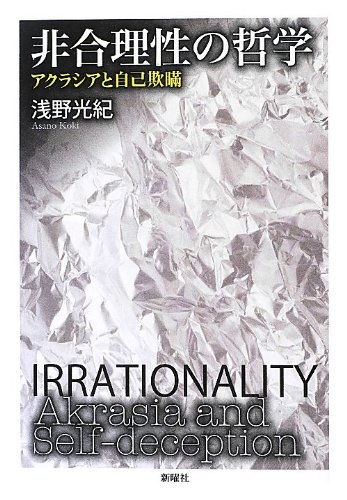20 0 0 0 IR 汎心論と物理主義
- 著者
- 浅野 光紀
- 出版者
- 三田哲學會
- 雑誌
- 哲学 (ISSN:05632099)
- 巻号頁・発行日
- vol.135, pp.25-43, 2015-03
投稿論文Panpsychism is the view that all things have mind or a mindlike quality, whether or not they are parts of living organisms. The purpose of this paper is to clarify this basic thesis and examine the historical meaning of the recent resurgence of panpsychism in the contemporary mind-body debate.Modern Physicalism inherited the Cartesian, dualistic conception of matter, which is lifeless and devoid of any experiential character. I will argue that this makes it difficult even for the weakest form of physicalism, namely emergentism or non-reductive materialism, to coherently reconcile its two basic doctorines 'physicalist ontology and reality of mind' and panpsychism more plausible.
1 0 0 0 OA 二つのアクラシア:懐疑論論駁
- 著者
- 浅野 光紀
- 出版者
- The Philosophy of Science Society, Japan
- 雑誌
- 科学哲学 (ISSN:02893428)
- 巻号頁・発行日
- vol.41, no.2, pp.2_17-2_29, 2008 (Released:2009-08-31)
- 参考文献数
- 14
Socratic Skepticism of akrasia denies the existence of free and intentional action contrary to one's best judgment. The rationalistic assumption behind this idea is that we can reinterpret the central cases of akrasia as preceded by the preference reversal, or the change of best judgment which is caused by the temporal or physical proximity of the rewards, i.e., the immediate pleasure. I will show that the skeptic substitute for akrasia has exactly the same structure as what Pears calls “self-deceptive akrasia” and examine the scope of this approach to cover all the cases of akrasia, with a view to confirming the ontological possibility of genuine cases.
1 0 0 0 OA 自己欺瞞における意図
- 著者
- 浅野 光紀
- 出版者
- 日本哲学会
- 雑誌
- 哲学 (ISSN:03873358)
- 巻号頁・発行日
- vol.2009, no.60, pp.137-152_L9, 2009 (Released:2010-11-09)
- 参考文献数
- 38
Can we be unaware of the intention which is actually guiding our own purposeful behavior? This is the question I shall tackle in this paper, discussing the paradoxical nature of the phenomenon: self-deception. When the deceiver and the deceived are one and the same person,the deceptive intention of the former seems to be easily detected by the latter, rendering the whole project self-defeating. But what exactly is intentional about self-deception? Or is it an unintentional process after all?In this paper I shall focus on the various data-manipulating strategies in which the self-deceiver engages during the process of making himself believe what he knows to be false. These are intentional activities the motive of which is to reduce the anxiety caused by the unpleasant true belief. I will clarify the conditions under which the privileged access to our own mental states breaks down and secure the ontological possibility of self-deception without reducing it either to unintentional wishful thinking or to ‘Pascal’s wager’, namely an explicit conscious attempt at self-reformation.
1 0 0 0 OA アクラシアと実践推理
- 著者
- 浅野 光紀
- 出版者
- 日本哲学会
- 雑誌
- 哲学 (ISSN:03873358)
- 巻号頁・発行日
- vol.2006, no.57, pp.113-124,6, 2006-04-01 (Released:2009-07-23)
Practical reasoning is deliberation about what to do. In order to figure out the best thing for her to do, the agent weighs both the reasons for and against a particular course of action and finally forms the judgment: "All things considered, I should do x". In cases of akrasia, however, the agent curiously fails to abide by this best judgment. She freely and intentionally does something that she knows well, at the time of action, to be worse than the best alternative. What is the meaning of this irrational, self-destructive action? How can it be even possible?The chief aim of this paper is to explain how we can act freely against our best judgment, but this task will also lead us to see the significance of akrasia for the contemporary philosophy of action. The significance of akrasia, I shall argue, lies in the fact that it reveals the other crucial determinants of our actions than practical reasoning, the importance of which has not yet been fully recognized and emphasized in the philosophy of action.
1 0 0 0 非合理性の哲学 : アクラシアと自己欺瞞
1 0 0 0 OA 自己欺瞞はいかにして可能か
- 著者
- 浅野 光紀
- 出版者
- 慶應義塾大学
- 雑誌
- 哲學 (ISSN:05632099)
- 巻号頁・発行日
- vol.109, pp.23-46, 2003-03
投稿論文1. 問題の提示 : 二つのパラドクス2. 心の分割論について : 若干のコメント3. 自己欺瞞の具体例と論点の整理4. メレの解決法とその問題点5. 信念のパラドクスの解決6. 意図のパラドクスの解決In this essay, I shall deal with self-deception in its most literal sense, namely "to deceive oneself intentionally into believing what one knows to be false". Admittedly, this phenomenon has long been recognized to be psychologically perplexing and philosophically paradoxical. How could one person knowing the truth get himself to believe the opposite and, as a result, simultaneously hold the contradictory beliefs ? Moreover, the knowledge of one's own intention to deceive oneself should make the project self-defeating because no one can be deceived if he knows the deceiver's intention and motives whether or not they are one and the same person. What follows is an attempt to resolve these problems and clarify the nature and etiology of self-deception. Examining carefully a variety of ways in which desire can influence beliefformation by biasing our cognitive processes, I propose a coherent description of self-deception which is real and common in our daily life. In due course it will be shown that our ability to know our own mental states is limited and we can be mistaken about and unaware of the reasons on which we act.

